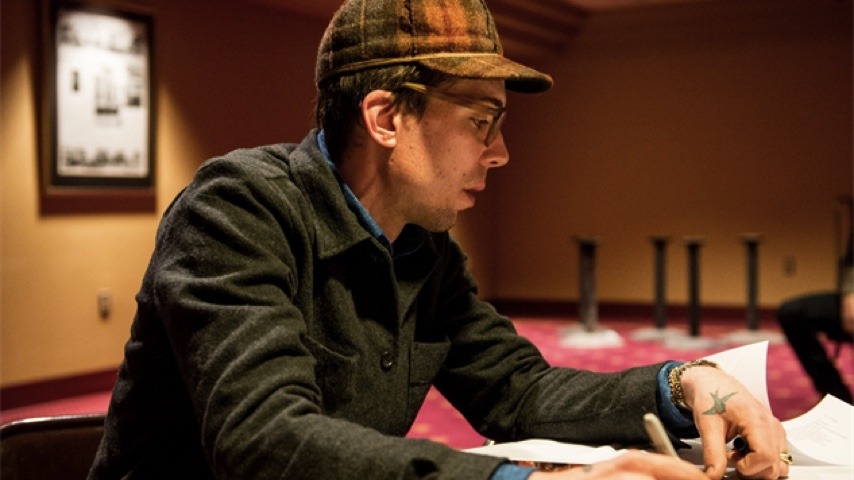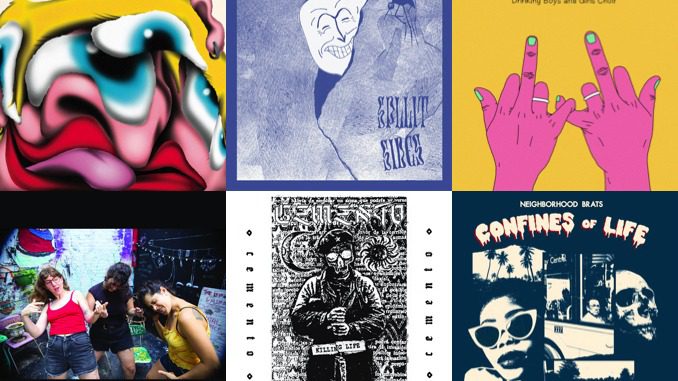Justin Townes Earle was born beneath the heavy weight of two names. Steve Earle was his father; Townes Van Zandt was Steve’s mentor; together they were two of the greatest American songwriters of the late 20th century. Together they also struggled with drug and alcohol problems from the ‘70s into the ‘90s. We don’t yet know how Justin died at age 38 on Thursday at his home in Nashville, but he was upfront about his own battles with addiction.
Despite the weight of those names, Justin improbably emerged as one of the best songwriters of the first quarter of the 21st century. Equally improbably, he sobered up enough to reel off a string of five masterful albums from 2012 through last year’s The Saint of Lost Causes.
Like anyone trying to climb out of the shadow of a famous parent or famous mentor, it took Justin a while to find his own voice. His first three releases—the 2007 EP Yuma, the 2008 LP The Good Life and the 2009 LP Midnight at the Movies—showcased his already considerable skills as a wordsmith, but the records owed an obvious debt to Townes’ folk minimalism and Steve’s country-rock maximalism.
On Harlem River Blues, Justin forged his signature sound: a kind of country blues with a lazy, pre-rock swing to it. The lyrics were a bit generically retro, and he sabotaged the record’s release by falling off the wagon, but he was clearly onto something. His breakthrough came in 2012, when he married his new sound to his earlier way with words and created the masterpiece Nothing’s Gonna Change the Way You Feel About Me Now.
“I’ve never heard it put like that,” Justin said about this analysis in 2012, “but, yeah, that does make sense. This record is sort of the culmination of the process. I did my folkie thing with Yuma, my honky-tonk thing with Good Life, the experimental thing with Midnight, and I’ve arrived at this more bluesy, more country, more Staple Singers-like sound…. On this album, maybe the J.J. Cale came out of me. He had that way of singing real softly into tube or ribbon mics, where you get really close and sing really softly and let the microphone do its work.”
That 2012 album includes what is perhaps his greatest song, “Unfortunately, Anna.” The song’s narrator is driving down Fatherland Avenue in East Nashville when he sees an ex-girlfriend walking in the rain. He rolls down the window and asks, “Where you wanna go?” She says, “I don’t know, just anywhere but here.”
The song opens very quietly with acoustic guitar, pedal steel and Justin’s hushed, sad tenor. It’s as if he were reluctant to tell this story or to look in this woman’s face because it might be a reflection of his own. Like him, she’s been walking the streets alone at night. Like him, she’s been wondering how her mama has been doing in another town. Like him, she feels all the pressures of life “pushing down on me [till] I’m about to scream.” Like him, she’s hoping that a change of scenery will mean a change of luck.
The listener can feel the pressure building on the car’s two occupants as slowly but surely fiddle, bowed bass, drum brushes, trumpet and saxophone are added to the melancholy music. On the extraordinary bridge, the driver watches Anna in the rear-view mirror and gives her the only answer he can, the only answer he can give himself, an unpalatable truth: “All this time you’ve been waiting for the world to change, but unfortunately, Anna, it’s you who needs to change.” On those last five words, all the instruments fall away but the high-pitched steel and Earle’s raspy, anguished voice.
“In ‘Unfortunately, Anna,’ I was trying to show the confusion that exists among my generation,” Earle explained at the time. “We are a generation without connection. It’s the least-voting generation in a long time. We saw young people get really rich really fast, which created this money-hungry stampede where we stepped on anyone in our way. All the schemes that were funny when we were in our 20s aren’t so cute anymore.
“I was an already-screwed-up kid who got a job that allowed me to run away from everything for a long, long time. Eventually, though, I built up enough crap that it started catching up with me. Most people who run figure that out eventually: If you run, you’re going to get caught. Yeah, Anna’s on the street, but what’s that guy doing driving around on the same streets? A lot of times when we try to save people, we’re the ones who need saving.”
I interviewed Justin four times between 2011 and 2019—three times for this magazine and once for Texas Music Magazine—and he was always smart, skeptical and unfiltered. Unlike his father, a legendary motormouth who could turn a single question into 10 minutes of oratorical showmanship, Justin got straight to the point with scalpel-slicing efficiency and never seemed to care if that point reflected well on him or not.
If he was surprisingly candid about his parents’ gifts and failures, he was just as blunt about his own. And his parents never complained about his interview comments or his song lyrics about them.
“No one’s been offended by it yet,” Justin told me in 2015. “My mother and father know they’ve had a huge effect on me. I’ve never said anybody’s name, and I’ve never laid our specific scenarios. My father, during his career, has done the same thing; if anything, he’s been a little more bold. There’s nothing artistic about diary entries. You have to know the difference between emotions and emotional songs. It’s an easily misunderstood line.”
Justin released his next pair of albums from material cut at the same sessions: Single Mothers in the fall of 2014 and Absent Fathers in the spring of 2015. The songs were not so much about the titular characters as about the children of single moms and missing dads who did not provide helpful models for romantic relationships.
“It’s not like my parents were the only single mothers and absent fathers in the world,” he added. “I grew up in Nashville in a relatively poor neighborhood, probably because it was full of musicians. Unfortunately, musicians create a lot of single mothers and bastard children. So the songs aren’t necessarily about my mother; they’re about all single mothers, and no one can deny they have their back up against the wall.”
That same neighborhood was the setting for the 2017 album, Kids in the Streets. It was an integrated area full of Mexican, black and poor-white kids listening to grunge and hip-hop, getting into trouble and swallowing anything that would get them high.
The difference for Justin was that Steve and his friends were world-class musicians who pulled back the curtain on a wider world of music. When Justin was 12 years old he saw his favorite band Nirvana play Leadbelly’s “Where Did You Sleep Last Night” (aka “In the Pines”) on MTV’s Unplugged show, and the youngster began to make connections between his world and his father’s world.
“Nirvana’s Unplugged record changed the way I listened to music,” Justin told me in 2017. “There was a darkness to ‘Where Did You Sleep Last Night’ that I really liked…. By the time I was 13, my friends were listening to nothing but hip-hop, which I loved, but I had to sneak off to listen to John Wesley Harding so my friends wouldn’t give me shit about it.”
He lamented the vanishing of that neighborhood, a victim of Nashville’s relentless gentrification and rising rents. He missed the astonishing variety of his friends then and all the wild things they did, even if they seemed crazily perilous in retrospect. On the song “15-25,” set to New Orleans funk, he claims that he as “no regrets,” but in the next breath he admits, “I’m probably lucky that I survived,” because “I could be doing 25 to life.”
“At this stage in my life,” he said in 2017, “I’m able to look back and see clearly that I was a dangerous, wild kid. I wasn’t music-industry arrogant, but I was definitely adolescent arrogant: ‘I can get away with anything; just watch me.’ When I say in that song, ‘I could be doing 25 to life,’ I actually could have done a lot worse than that. The person I was then contained a lot of different pieces, and some of those pieces are still here, but there’s also the need to move on. Now that I know how far I can go, I also know how far I can’t go.”
It was that hard-won knowledge that made him one of the finest artists of the 2010s. Against all odds, he lived up to the expectations of the two names he was given at birth. With his slinky grooves, his sleepy vocals, his noirish descriptions and his snippets of theatrical dialogue, his songs were as unforgettable as they were underappreciated. And now, just as the 2020s are beginning, just as he should be entering his 40s, he’s gone.




